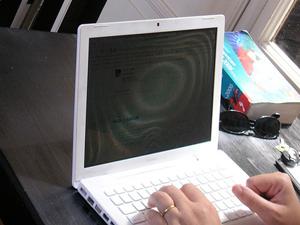Internet addiction and depression
(Image by Flickr user Beatrice Murch (cc: by-nc-sa))
This story is adapted from a broadcast audio segment; use audio player to listen to story in its entirety.
Story by Clark Boyd, PRI’s “The World”
Researchers at the University of Leeds in England have just published a study on the links between excessive internet use and depression.
Using a fairly standard survey, the researchers sampled more than 1,000 people to get a handle on the level of their internet use and their level of depression to see whether there was a link between the two.
Dr. Catroina Harrison of Leeds University says respondents were asked whether being online interfered with their family relationships and their working life; whether they looked forward to going online, and to what extent; and when online, whether they spent a longer amount of time online than they intended to.
The basic finding of the study: “People who spend a lot of time browsing the net are more likely to show depressive symptoms. Researchers found striking evidence that some users have developed a compulsive internet habit, whereby they replace real-life social interaction with online chat rooms and social networking sites. The results suggest that this type of addictive surfing can have a serious impact on mental health.”
But just as interesting, Harrison says, is trying to figure out how to measure “Internet addiction” in the first place.
Putting things in perspective, Harrison admitted that most people spend a lot more time online, and probably more and more every day. Between shopping, social networking and all the different things that people do online, it’s really becoming a part of their lives.
She says by and large the study found that most people adapt to it. They’ve made it a healthy part of their lives.
Harrison found in their sample that just a little more than one percent of those surveyed would be classified as severely addicted. Those with severe addiction also had high levels of depression.
“By our data what we can conclude is that there is a very strong relationship between levels of addiction and levels of depression. More addicted people are more depressed, that’s no doubt,” she said.
But are more people depressed these days because they’re going to the internet, or is the internet actually making them all more depressed?
This is the chicken-and-the-egg, million dollar question that Harrison wants to answer. However, she says that’s not what the study was designed to do.
She speculates that people who might be naturally inclined to be a little bit depressed may go online because they don’t have anybody to talk to. Then, being online further reinforces their feeling of isolation and makes them feel more depressed. But she cautions against speculating too much. She said the next step of their study would be to develop a long-term way to track people over time to get a better understanding of depression and internet use.
PRI’s “The World” is a one-hour, weekday radio news magazine offering a mix of news, features, interviews, and music from around the globe. “The World” is a co-production of the BBC World Service, PRI and WGBH Boston. More “The World.”
